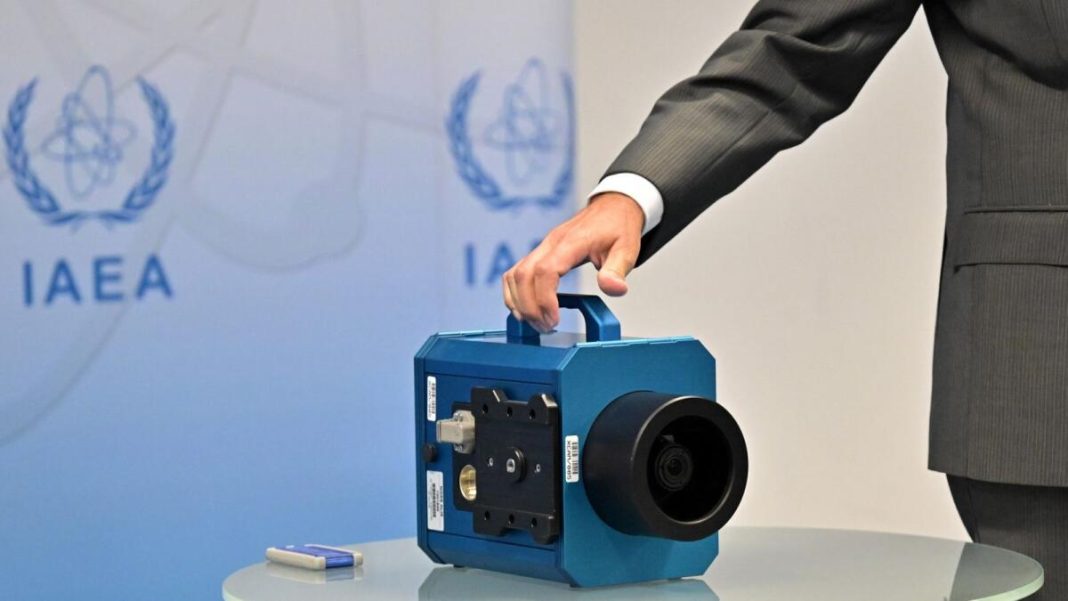The director-general of the International Atomic Energy Agency made the comments at a suddenly called news conference in Vienna, standing next to an example of the cameras installed across Iran.
Grossi stated the move poses a “serious challenge” to its efforts, warning that in three to four weeks, it would be unable to maintain a “continuity of knowledge” about Iran’s program.
“This would be a fatal blow” to negotiations over Iran’s tattered nuclear deal with world powers, Grossi continued.
”When we lose this, then it’s anybody’s guess,” he added.
Grossi said that would leave “40-something” cameras still in Iran.
The sites that would see cameras removed include its underground Natanz nuclear enrichment facility, as well as its facility in Isfahan, Grossi added.
“We are in a very tense situation with the negotiations over the (nuclear deal) at a low ebb,” Grossi stated, noting, “Now we are adding this to the picture; as you can see it’s not a very nice one.”
The IAEA earlier Thursday announced Grossi told members that Iran informed the agency that it planned to install two new cascades of the IR-6 at Natanz.
A cascade is a series of centrifuges hooked together to rapidly spin uranium gas to enrich it.
On Wednesday, the Atomic Energy Organization of Iran announced the Islamic republic has removed surveillance cameras of the IAEA which it said were beyond Tehran’s commitments under the safeguards agreement.
Tehran is angry at the IAEA over its chief’s recent visit to occupied Palestine and his accusations that Iran has not cooperated with the UN atomic agency.
Iran has stressed Grossi’s meeting with the Israeli regime officials shows that he has reduced the body to a political organization while the IAEA must only focus on its technical tasks.
Also on Wednesday, the United Nations nuclear watchdog’s 35-nation Board of Governors overwhelmingly passed a resolution criticising Iran for what it called “failing to explain uranium traces found at three undeclared sites”.
On Tuesday, the US and the three European signatories to the nuclear deal – Britain, France, and Germany – submitted a draft resolution to the IAEA’s Board of Governors, accusing Iran of failing to offer transparent responses to the UN agency’s questions over nuclear activities at three sites.
The director of the Atomic Energy Organization of Iran has stressed the country has no secret nuclear activities and undeclared atomic sites.
Mohammad Eslami told reporters on Wednesday that the alleged pieces of evidence raised in the report of the secretary general of the International Atomic Energy Agency, are part of a political move aimed at maintaining the so-called maximum pressure campaign against Tehran.
Eslami noted the Zionist regime is the mastermind behind the resolution.
Iranian officials have warned the IAEA against succumbing to political pressure, stressing Tehran has fully cooperated with the agency in resolving outstanding issues.
Foreign ministry spokesman Saeed Khatibzadeh stated on Monday that Iran would respond based on what happens at the board meeting.
Khatibzadeh added the IAEA’s reports, which stemmed from information in two quarterly reports on Iran’s nuclear activities, were “hasty” and “not accurate” and “overlook all the measures and responses that the country has provided with precision and in a technical way.”
Talks between Iran and the world powers in Vienna to salvage the 2015 nuclear deal have been stalled amid Washington’s refusal to respond to Iran’s proposals.
